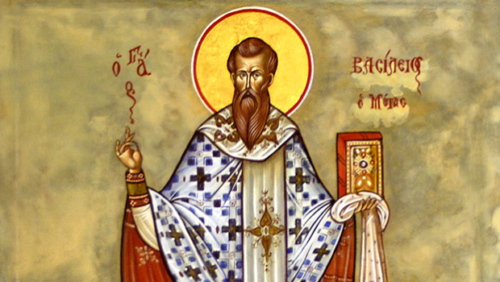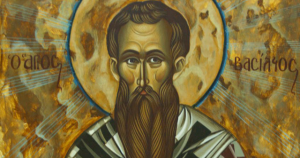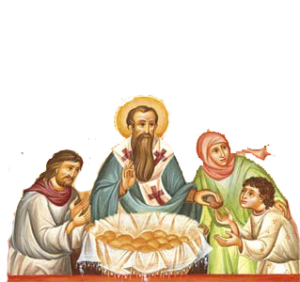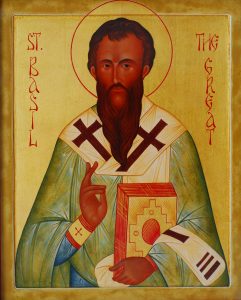
St. Basil the Great, Father and Doctor of the Church, was a monk, bishop, and one of the most significant figures in the early centuries of the Church. Basil was born into a saintly family ca. 329 at Caesarea, Cappadocia in Asia Minor (present-day Turkey). The family was well-educated and wealthy. St. Basil the Elder and St. Emmelia, his parents, had ten children. Basil’s primary education came from his father, who was a teacher, but who died when Basil was young. It was continued under the guidance of his grandmother, St. Macrina the Elder. Macrina and her husband had suffered persecution and years of exile before the conversion of Emperor Constantine.
MANY YEARS OF THE FINEST EDUCATION
Basil continued his studies at Constantinople and then at Athens, and he developed a close friendship with another scholar, [St.] Gregory of Nazianzen. When he returned to Caesarea, he began to teach rhetoric and practice law. Soon after his return, two of his siblings died, which grieved him deeply. His sister, Macrina the Younger, in particular had influenced him in the direction of a non-secular life, for she, with her mother, had formed an early version of a women’s monastic group on the family property. Basil withdrew from his work and set out on a journey to visit recently established monastic communities in what are now Syria, Palestine, and Egypt.
DRAWN TO MONASTICISM
Having gained valuable knowledge and inspiration from these visits, he returned in 358 and settled as a hermit near the community his sister had established. He gave away everything he owned and lived a life of prayer and penance. Numerous other men were attracted to this type of life, and Basil composed a rule for daily life and thus formed the first monastic community in Asia Minor. Ordained a priest in 363, Basil returned to Caesarea in 365 when his friend Gregory needed his help in fighting off the Arian heresy at Nazianzus. While there, Basil showed a great talent for organization, a lack of fear of powerful people, and a soft heart for the needs of the poor.
A FOE OF HERETICS

When the bishop of Caesarea died in 370, Basil was elected metropolitan archbishop, placing him over dozens of other bishops, and in direct opposition to the Eastern Roman Emperor Valens, an Arian heretic. Basil’s extensive education, coupled with his years of mortification and prayer prepared him well for the demands of his vocation. As a bishop, he was unflinching when it came to orthodoxy of belief, and he expected self-discipline from his priests. He was a skilled preacher, drawing large crowds who came to hear him. He withstood the opposition of Emperor Valens, who himself appeared at the church bearing weapons, but who eventually backed down after making a large donation for the poor. Basil was resented by the wealthy due to his criticisms of their very worldly forms of entertainment, and his pointing out their duty to share some of their wealth with the most needy. He wanted well prepared religious to be the Church’s primary defenders against the plague of heresies, which were widespread and entrenched in those times.
THE HEART OF A PASTOR

Bishop Basil was mindful of the needs of the poor and the sick, and he had a hospice built, and, eventually, an entire health care complex that included an inn for pilgrims, housing for workers, and a priests’ residence, a complex that was called “The New City”. He also saw to the building of hospitals throughout his diocese, a practice that had been unknown in the pagan world. Basil was a bishop for only nine years, and he suffered a number of health problems, which were aggravated by the opposition he endured from both within and without the Church. He especially felt the burden of upholding orthodoxy after the death of his friend, [St.] Athanasius. He also had to deal with believers who were in the prostitution business, whom he excommunicated in the hopes of their repentance. Basil died at Caesarea on January 1, 379 at about the age of fifty. Because of his great benevolence, his death was mourned by not only Christians, but also Jews and pagans.
St. Basil the Great was a towering figure in the Church during a crucial period of defending the truths of the Faith established by Christ and His apostles, which were under attack. What he accomplished in just nine years as a bishop was astounding. He was a prolific writer, penning treatises on the divinity of all three Persons of the Trinity, as well as on Scripture, morality, and monastic living. Over three hundred of his letters have survived; written to everyone from popes and emperors to poor widows. It is largely due to his influence that Arianism was firmly renounced at the Church Council at Constantinople just two years after his death.
A NEW KIND OF MONASTICISM

He is called the Father of Eastern Monasticism. Unlike the type of eremitic life founded by St. Anthony and others in Egypt, that established by Basil covered the fixed hours of daily community activity, reduced the harshness of penances and dealt with interaction with the outside world. His monks were to teach children, see to the care of orphans, and to learn important life skills for the good of the community, such as agriculture and carpentry. His actions were key to the formation of the Liturgy of the Hours, in which prayers are offered at periodic times of the day, prayers which have been offered by priests and religious for many centuries. There are only a few saints known as “The Great”, and St. Basil is one of them. He is a Doctor of the Church, and the patron of Eastern monasticism and of hospital administrators. He shares his feast day of January 2 with his friend Gregory of Nazianzen in the western (Roman) Church.
